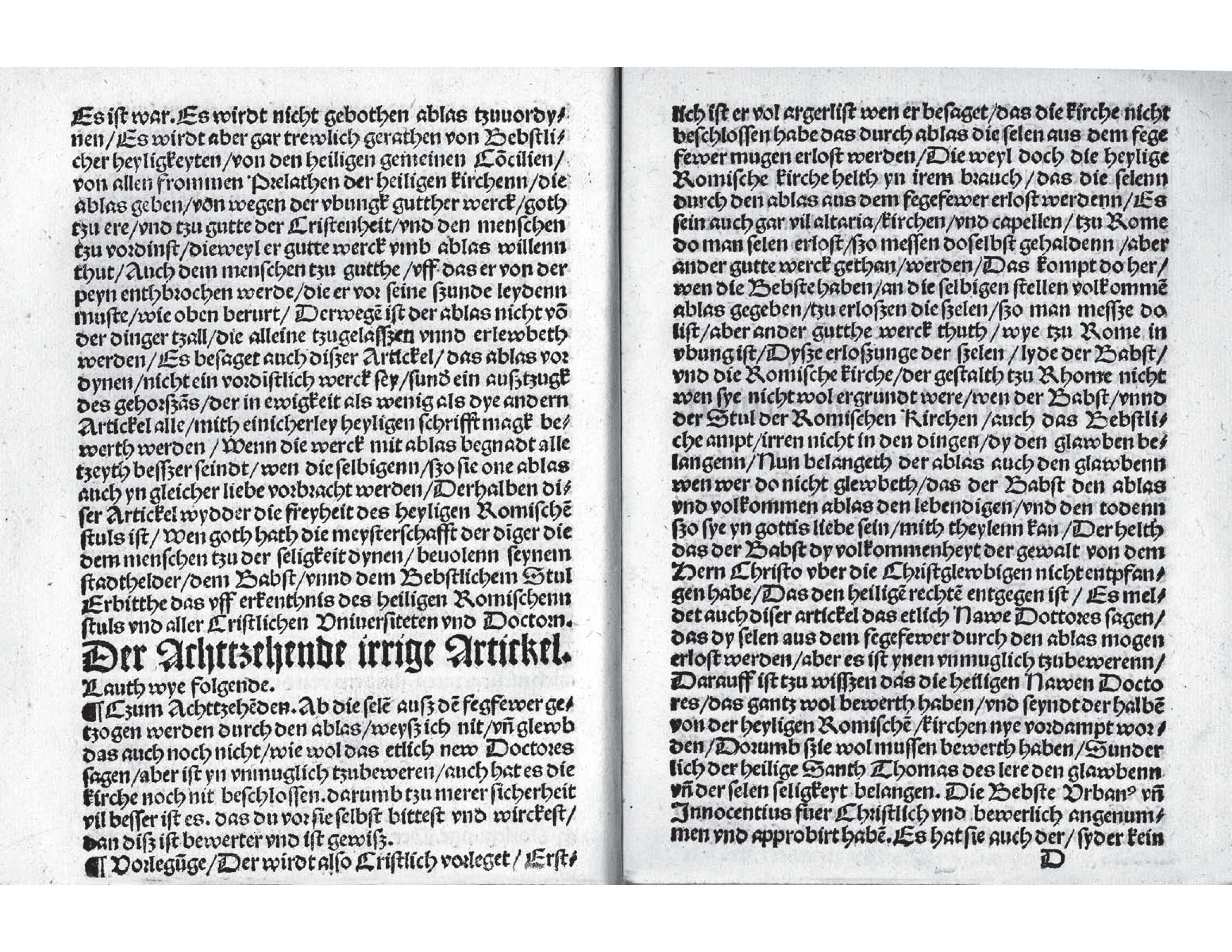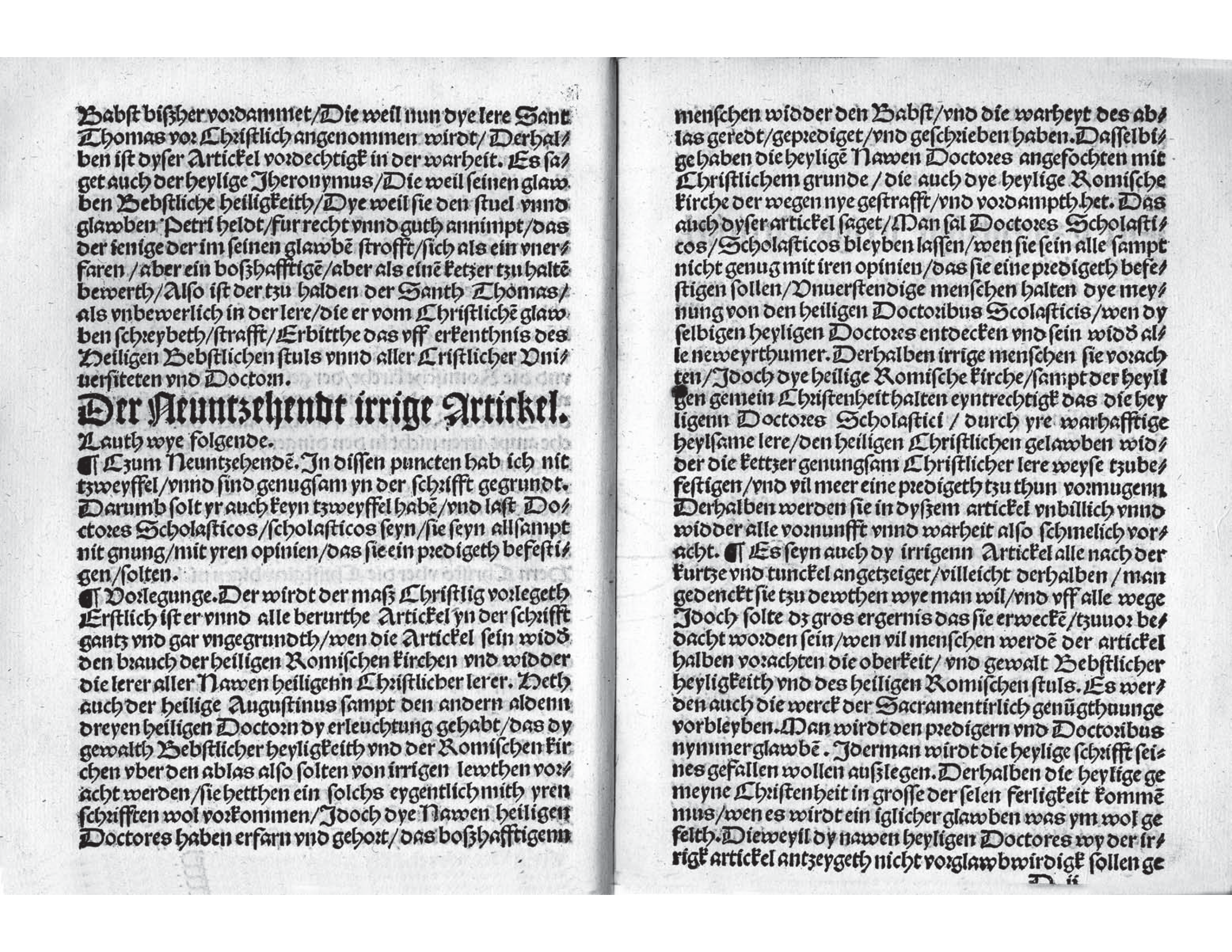XVIII.
The eighteenth erroneous article reads as follows:
“Eighteenth, whether souls are drawn out of purgatory by indulgences, I do not know. Still, I do not believe so, although various modern scholars say so. But it is impossible for them to prove it, and furthermore, the Church has not yet come to a conclusion. Therefore, for greater certainty it is better that you pray for them and labor for them. For this is more proven and is certain.”
REBUTTAL ¶ It is refuted thusly in Christian manner: First, it is full of malicious guile, when it claims that the Church has not concluded that souls can be delivered from purgatory through indulgences. For the tradition of the Roman Church does maintain that souls are delivered from purgatory by an indulgence. There are also very many altars, churches, and chapels in Rome, where souls are released by celebrating Masses or by doing other good works. This is so because the popes have granted plenary indulgences to these very places to release souls, whenever Mass is celebrated there or other good words are carried out, as is the practice in Rome. The pope and the Roman Church would not permit this release of souls in such manner in Rome, if it were not thoroughly established. For the pope and the holy See, as well as the papal office, do not err in matters that concern the faith.
Now indulgences also concern faith, for whoever does not believe that the pope can grant indulgences and plenary indulgences to the living and the dead—as long as they remain in God’s love—that person maintains that the pope has not received complete authority from the Lord Christ over Christian believers, which contradicts sacred canon law.
This article also announces that various modern theologians say that souls can be delivered from purgatory through indulgences, but that it is impossible for them to prove it. In this regard one should know that the revered modern theologians have indeed established it very well and have never been condemned for that by the holy Roman Church. Accordingly, they must well have proven it. Especially is this the case with St. Thomas, whose teaching is concerned with faith and the salvation of souls. The Popes Urban and Innocent have accepted and affirmed his teaching as Christian and true.Citation: 36Urban IV, Pope 1261–1264, French, never resided in Rome. Innocent VI, Pope 1352–1362, French, acted severely toward the Spiritual Franciscans. Aquinas served as theological counselor to this papal court in Viterbo. Furthermore, no following pope has ever condemned his teaching. Because the teaching of St. Thomas is accepted as Christian, the truth of this article is truly questionable. Also St. Jerome says, “Because the faith of His Papal Holiness is accepted as right and good, since he occupies the throne and faith of Peter, so then that person who reproves his [the pope’s] faith proves himself to be ignorant, or evil, or a heretic.”Citation: 37St. Jerome, “Epistula ad Damasum (No. 15),” Corpus scriptorum ecclesiasticorum Latinorum (Vindobonae: Verlag der Österreichischen Akademie der Wissenschaften, 1996), 54:62–67. And this is how that person is to be judged who reproves St. Thomas’ teaching of the Christian faith as unsubstantiated.
This is offered in acknowledgment of the holy See and of all Christian universities and doctors.
Notes
- 36
- Urban IV, Pope 1261–1264, French, never resided in Rome. Innocent VI, Pope 1352–1362, French, acted severely toward the Spiritual Franciscans. Aquinas served as theological counselor to this papal court in Viterbo.
- 37
- St. Jerome, “Epistula ad Damasum (No. 15),” Corpus scriptorum ecclesiasticorum Latinorum (Vindobonae: Verlag der Österreichischen Akademie der Wissenschaften, 1996), 54:62–67.

